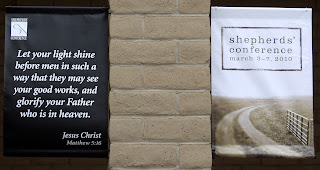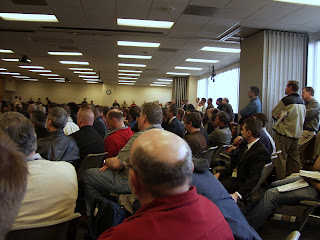SC: Seminar - "You Might be a Dispensationalist if..."
Michael Vlach opens with good humor, laughing at ourselves as dispensationalists. He cites Kenneth Gentry's play on Jeff Foxworthy's comedic bit, which is not listed in the notes. Here is a link to Gentry's post. Some of the better ones:
- If you always leave the top down on your convertible — just in case.
- If bar code scanners make you nervous.
- If you are a book collector and you long to locate a copy of The Late Great Planet Earth in the original Greek.
- If you believe that the term "Early Church Fathers" refers to J. N. Darby, C. I. Scofield and Lewis Sperry Chafer.
- If you get excited when you see a sentence with a parenthesis.
- If you count trampoline aerobics as "Rapture Practice" in your 4:00 am devotions each morning. (You get extra credit if you believe the neighbors who live in the apartment below you are non-Christians and are persecuting you because they complain.)
- If your personal hymn favorite is: "My hope is built on nothing less, than Scofield's notes and Moody Press."
- If you think there are only two millennial positions: Pre-Trib and Liberal.

Funny stuff. We should laugh at ourselves or, at least, laugh at our silly brothers who would give Gentry his inspiration.
Vlach does have notes available, which I will link to once they are available. He notes that our commitment should be to Scripture, not to a system. He states that he is not giving a full defense of dispensationalism.

(Also, check out on his site, "What is Dispensationalism?" and his book, Dispensationalism: Essential Beliefs and Common Myths.)
The issues discussed in this system is how the Old Covenant and the Law of Moses deal with the New Covenant and the Law of Christ. It is important to see how these kinds of issues are related, and dispensationalism provides a viable alternative to covenant theology.
It is primarily concerned with ecclesiology (church) and eschatology (end-times) issues, built upon a grammatico-historical interpretations (normal reading taking into account history and grammar) of the Scripture.
Some of the myths of dispensationalism is that it calls for an Arminian, non-lordship view of salvation and an antinomian approach to Christian living. Vlach advocates none of these views and does not see them as linked to dispensationalism.
This is a hermeneutis issue: does the NT do away with the OT or somehow change the meaning of an OT passage? Does the authorial intent of OT writers become null with the advent of the NT? For instance, do references and promises to the temple and kingdom redirect to the church? Does the church become the "new" Israel?
 This is a typological issue: does the OT only represent types that will be replaced by NT archetypes? This is not an issue where one group believes in OT types and the other doesn't, because dispensationalists believe types exist. However, they do not believe Israel is a type for the church because God made unchanging promises to the nation. Whether the covenant theologian accepts the label "replacement," "supercessionism," or "fulfillment theology," it is a question of whether the church is OT Israel.
This is a typological issue: does the OT only represent types that will be replaced by NT archetypes? This is not an issue where one group believes in OT types and the other doesn't, because dispensationalists believe types exist. However, they do not believe Israel is a type for the church because God made unchanging promises to the nation. Whether the covenant theologian accepts the label "replacement," "supercessionism," or "fulfillment theology," it is a question of whether the church is OT Israel.I recommend you read his notes and listen to the MP3 when they are available. His take on the Foxworthy joke wasn't funny, but the entire presentation is quite informative.
PS: It was quite crowded, as the pictures show. I staked out my seat ahead of time, creating covetousness among some of my mates.




